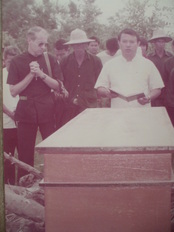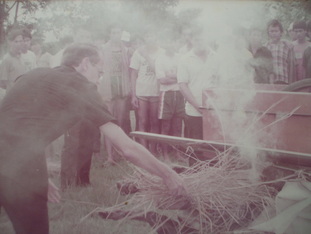|
Farmersville, Texas hit the world news with a threat to cover a Muslim cemetery with pigs’ blood to prevent Islamic burials there. America is set on a course of anti-Islamic posturing and potentially of violent action if the Internet and media are to be believed. Tempers are rising.
This is not, as it happens, the first time I have encountered community action against a religious cemetery. The first I heard about was in the early 90s when a community here in Chiang Mai (Hang Dong District) made national headlines by protesting a Christian cemetery in their vicinity. The cemetery had been authorized and was even being used for two or three burials. The protests threatened to grow into inter-religious violence until the Christians backed down and removed the bodies to another cemetery operated by a neighboring church not too far away. I seem to remember that the land was "rid" of its ghosts by a community rite after that and the whole matter disappeared. But it did not end there for us personally. In about 2003 Pramote and I were scouting out land to build our house. Dr. Amnuay Tapingkae introduced us to an elder of a small church who had a piece of land for sale with a great mountain view of Doi Sutape. It was surrounded on 3 sides by rice land. But when we went to look at the plot with the elder who owned it, in the weeds I found a wooden cross with a person’s name and dates, exactly as would be used in a Christian cemetery. Pramote was horrified. That ended the negotiations rather abruptly. No need to get the price of the land down from 700,000 baht for about half a rai. Even if they had given us 700 thousand Pramote was not going back there. That's when I made the connection in my memory with the cemetery protests years earlier. Cemeteries create strong emotional reactions. Actually, my first personal encounter with a community's refusal to let a Christian burial proceed was in 1984 in Ban Ti, Lampoon Province. A new small church had been established in Ban Ti. A team of seminary students I led was instrumental in getting the church established on a permanent basis. Tensions were sometimes high between Christians and non-Christians in those days, leading to incidents which never amounted to anything beyond losing face and need to re--establish peace and tranquility. Some months after our seminary team stopped visiting Ban Ti the first Christian died and the head of the Christian churches in the area with extensive contacts in the Lampoon Provincial headquarters secured permission for the Christians to use part of the community cremation grounds as a cemetery, as was the case with most of the other churches around there. On the day of the actual burial, however, after the morning funeral and the lunch, when it was time for interring the body we got word that the village people were not going to allow it. That appeared to be a signal for all the ordained ministers (6 or 7 of them), church officials and carloads of out of town guests to leave for home. The only ones left were me and a couple of seminary students, plus the members of the church and the body of the late Mr. Silver. As we moved to the cremation grounds where the grave was dug in readiness, the villagers began to come from all directions. Most of them had some sharp farm tool in hand, a scythe or machete, maybe a hoe. They numbered about 400 before long. They did not make a lot of noise or fuss, but they made it clear that we were not going to put that body into that hole that day. We could go back home with it, or take it somewhere else, but it was not going into the ground there. The Christian elders (3 of them, all new Christians) turned to me, as both the only remaining clergy person and as the one who had helped them get the church going. It was up to us to decide. One of the seminary students was bright and an excellent speaker. I got him to stand up on the wagon by the casket and I fed him the ideas which he declaimed to the assembly. "Calm down. We will not bury Mr. Silver here today. Mr. Silver is not here. His spirit has gone to be with Jesus soon after he died. All we have left is his body now turning green. When Christians die they leave this world and join a great host of others in heaven. It is a wonderful promise. We are gone from our body.” As soon as we had said we would not be burying the body there the crowd settled down and a few of them sat down on the ground. “We are Christians and so our right to practice our religion is protected by the King. We have a document permitting this burial right here. Christians favor burial for the dead, but you may not know that many Christians are also cremated. Others are disposed of in other ways. So we will have a cremation today, not because we prefer it, but because we do not want to create a great problem between Christians and non-Christians in the village. Christians and Buddhists are going to have to live together in peace and friendship here in Ban Ti as they do in San Kap Tong (next town over) and in Chiang Mai. We will cremate Mr. Silver's body, but we have prepared to bury it. So we will wait here while you gather enough wood for the cremation. Go quickly and bring back wood." It only took half an hour. The honor of lighting the fire fell to me. We skipped the fire crackers. A month ago one of the elders from Ban Ti and the student who had been with me that day joined several others here at our house for a ceremony and dinner. They remembered the cremation of Mr. Silver as clearly as I did. Really, being confronted by 400 determined farmers with sharp implements is hard to forget.
0 Comments
Leave a Reply. |
AuthorRev. Dr. Kenneth Dobson posts his weekly reflections on this blog. Archives
March 2024
Categories |
| Ken Dobson's Queer Ruminations from Thailand |
|


 RSS Feed
RSS Feed
